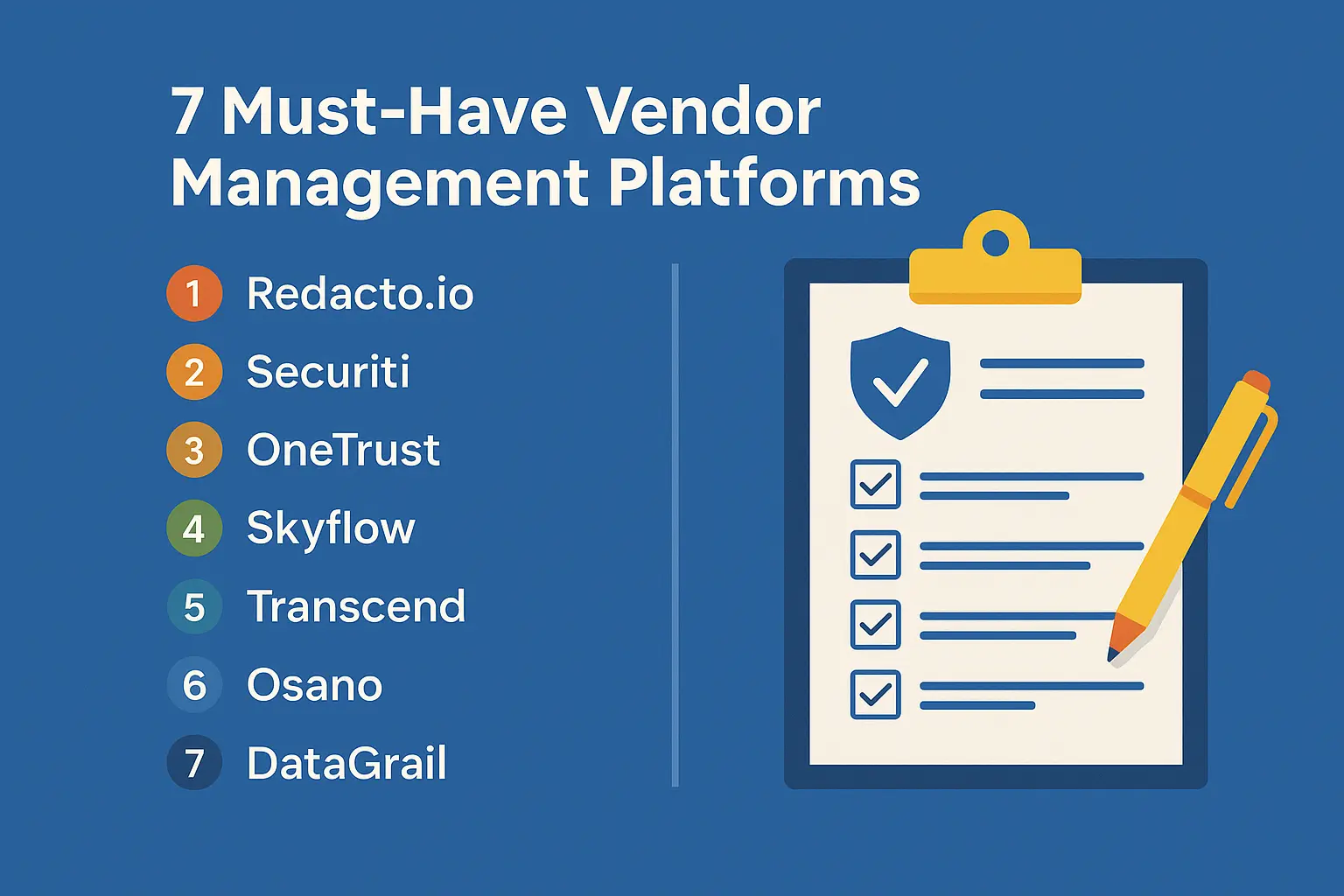
9 Top Consent Management Platform Tools to Consider in 2025
Data privacy has turned into an enormous concern to businesses and the challenging legislations, including GDPR in Europe, DPDP in India, and CCPA in California, pose high expectations. Handling user consent incorrectly can either cost the company a hefty fine or the lack of loyalty, which cannot go unnoticed by any company.
This is where a consent management platform can help. It is a technology that can easily enforce these laws and aid in customer relationships by not using customer data unethically.
Being an experienced researcher of privacy tech, I carefully crafted and tested a list of the best tools that would assist you in going through these issues. Check out these 9 best tools in terms of a consent management platform you can use in your business, with strengths that can put you on the right path.
1. Redacto Consent Management Tool
The consent management platform provided by Redacto enables easy adherence to privacy laws such as GDPR and DPDP that suit best in business ventures that require stringent data protection, like BFSI and Health Tech. It is developed to manage user rights both online and offline without having to go out of the way.
The consent manager at Redacto is a highlight in AI automation and a third party risk management that supports consent consistency with vendor data sharing to avoid legal problems. It is an intelligent computing choice for companies concerned with safety and compliance.
Pros:
- Provides 24/7 support for urgent compliance questions.
- Delivers detailed analytics to track consent trends over time.
- Integrates smoothly with enterprise privacy ecosystems.
Cons:
- May require initial setup time for complex systems.
- Premium features might stretch smaller budgets.
2. Usercentrics
Usercentrics is one of the most popular consent management platforms that can help to make your business compliant with GDPR, CCPA, and DPDP, and it is an ideal solution when you have a global scope of influence. It is more concerned with handling user consents across apps and websites.
Usercentrics is flexible with customizable cookie consent manager banners and multilingual support, which makes it an optimal choice to international businesses in e-commerce or SaaS, requiring bespoke solutions.
Pros:
- Extensive documentation for easy onboarding.
- Strong focus on user-friendly design options.
- Regular updates to match evolving regulations.
Cons:
- Can be overwhelming for small teams.
- Higher tiers needed for advanced features.
3. OneTrust
The OneTrust offers a powerful service of consent management platform to support GDPR, DPDP, and CCPA requirements with a focus on enterprises in the areas such as finance and healthcare. It is configured to handle in-depth privacy.
Its consent manager also performs well when it comes to deep integration and can sync with marketing tools, which is much better-suited to organizations of a large size that require a single approach in managing complex data tasks and compliance requirements.
Pros:
- Offers detailed reporting for audit readiness.
- Supports a wide range of integrations.
- Trusted by many Fortune 500 companies.
Cons:
- Pricing can be prohibitive for startups.
- Interface may feel complex initially.
4. CookieYes
A user-friendly, GDPR and CCPA consent management platform, cookieYes is ideal to meet the needs of small to medium businesses working with website consents. It makes it simple and cheap.
This cookie consent manager excels in streamlined setup of banners to display, making it suitable to online stores or blogs that require a fast-track installation of the first compliant systems without technical burdens.
Pros:
- Very budget-friendly for smaller businesses.
- Simple setup process with minimal coding.
- Responsive support for quick resolutions.
Cons:
- Limited features for enterprise-scale needs.
- Less focus on offline consent tracking.
5. consentmanager
consentmanager is a reliable GDPR, DPDP, CCPA consent management platform, available to any company within the European region and beyond. It is fantastic with regard to web-based consent solutions.
Its multi-platform support and customizable designs excel with its consent manager and it is suitable to mid-sized firms in SaaS or retail where user interfaces required vary in design needs.
Pros:
- Highly customizable consent interfaces.
- Supports a variety of platforms easily.
- Transparent pricing structure for clarity.
Cons:
- Advanced features require paid plans.
- May lack deep third-party integrations.
6. Ketch
Ketch is a contemporary consent management platform that promises GDPR, CCPA, and DPDP compliance to businesses seeking automated privacy tools and solutions. It is fresh and enterprise-ready.
Its consent management platform places particular focus on programmatic consent enabling, which makes it a great fit in data-driven companies in the tech or e-commerce sectors looking to integrate it into their current customer data platform.
Pros:
- Cutting-edge automation for consent workflows.
- Strong focus on data-driven personalization.
- Active community for user feedback.
Cons:
- Steeper learning curve for beginners.
- Primarily suited for larger operations.
7. Didomi
Didomi provides an effective GDPR, DPDP and CCPA consent management platform to global companies that require a dramatic consent management platform. It is designed to suit Web and mobile platforms.
Its cookie consent manager provides sophisticated customization and analytics, which suits the needs of industries such as media or e-commerce where user experience and compliance have to intertwine.
Pros:
- Excellent mobile app consent features.
- In-depth analytics for user behavior.
- Strong focus on GDPR-specific needs.
Cons:
- Setup can be time-intensive initially.
- Costs may rise with added features.
8. Osano
Osano offers a friendly-looking consent management platform that complies with GDPR, CCPA, and DPDP and is ideal to use by any company at any scale that requires simple privacy features. It values ease of use.
With automatic scanning and consent banners, the consent manager is a good option for either startups or mid-sized companies in HealthTech that need hassle-free, compliant installations.
Pros:
- Intuitive dashboard for easy navigation.
- Automated compliance checks save time.
- Affordable plans for growing businesses.
Cons:
- Limited advanced customization options.
- May not scale for complex enterprises.
9. Cookie Information
Cookie Information is a reliable consent management platform for GDPR and CCPA compliance, designed for businesses focusing on website privacy. It’s a practical option for European markets.
Its cookie consent manager offers simple banner setups and audit trails, suiting small to medium e-commerce or content sites needing compliant, no-fuss consent management solutions.
Pros:
- Easy-to-understand compliance reports.
- Focused support for European laws.
- Quick implementation for smaller sites.
Cons:
- Less suited for global multi-jurisdictional needs.
- Feature set narrower than competitors.
Conclusion
Choosing the right consent management platform is crucial for staying compliant with laws like GDPR, DPDP, and CCPA while keeping your customers’ trust intact. Without proper tools, businesses risk penalties or damaged reputations, which no one can afford in today’s data-driven world.
Explore powerful solutions at Redacto or request a demo to tackle your privacy challenges head-on. With the right consent management platform, you’re not just meeting laws—you’re building trust that lasts. Which tool fits your needs best? Let’s get started on securing your data today!
FAQs
1. What exactly is a consent management platform?
A consent management platform is a tool that helps businesses collect, track, and manage user permissions for data usage, ensuring compliance with laws like GDPR, DPDP, and CCPA easily.
2. How does a consent manager help with legal compliance?
A consent manager records user permissions to meet GDPR, DPDP, and CCPA rules, preventing fines by proving consent for data use, making compliance straightforward for any business.
3. What’s the role of a cookie consent manager on websites?
A cookie consent manager displays banners asking users for tracking permission, vital for GDPR and CCPA compliance, ensuring websites respect user choices on data collection legally.
4. How does a cmps login benefit business admins?
A cmps login gives admins access to customize consent settings and monitor data, simplifying consent management tasks and ensuring alignment with laws like GDPR or DPDP efficiently.
5. Why should businesses invest in consent management tools?
Investing in consent management tools avoids penalties under GDPR, DPDP, and CCPA, builds customer trust by respecting data choices, and streamlines privacy processes for smoother operations.




%20Redacto%20logo_New.png)



.jpg)

.jpg)
.png)
